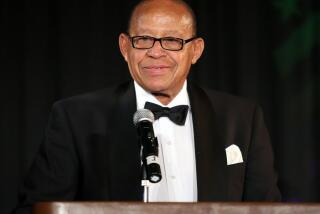Remembering the newspaper carrier
- Share via
Each night for 25 years my dad drove the streets of this city with more than 300 newspapers packed in his car. While most people slept, he delivered papers in housing projects and to homes in areas of the city some would be nervous to visit.
These days my dad, Simeon Stewart, is an alumnus of a fading fraternity: the home newspaper carrier. Technically he never worked for the Los Angeles Times; he worked all those years for Mr. Norman Wilson Sr., who held a contract to deliver The Times in South Los Angeles and had a crew of men to do it. Like my dad, most of them were African Americans with wives and families and mortgages. The paper route was a second job that helped make ends meet.
The home carrier is the low man on the newspaper totem pole, an invisible person who works alone in the dark hours. Yet these people are often the strongest link the community has to the paper.
There are readers who never forgot my dad, like Mrs. Rose Laskey, whose paper had to be placed precisely on the window sill of her home in the Watts area. The house was so close to the sidewalk, someone could easily grab the family’s paper. Someone did -- so often that Mrs. Laskey called for help and got my dad. The window sill, they decided, was the solution.
It’s impossible, even for a skilled carrier, to throw a paper from the car window and land it on a window sill. So each night my dad got out of his car, walked up to the house and placed the paper where it would be safe. Finally able to read her paper, Mrs. Laskey was pleased, and my dad had made a lasting friendship.
Special-delivery requests like Mrs. Laskey’s were common. Theft, dogs, sprinklers, rain -- all caused trouble. My dad kept notes at hand until he had committed the particulars of each new delivery to memory. As a child, what I committed to memory was the Christmas bounty the paper route helped bring.
In December, Mr. Wilson handed out stacks of Christmas cards to his carriers, one for every reader. The image on the card I remember was of a smiling Santa Claus driving a convertible. Instead of toys, Santa’s bag was filled with rolled copies of The Times. Inside the message was a simple, “Season’s Greetings and Happy New Year from your Times carrier.”
Sometime in early December, readers received a personally signed holiday card from my dad, along with the paper. Then the incredible happened. In the days and weeks that followed, Christmas cards arrived in the mailbox of our home in South Los Angeles, with notes of thank you, sent by people on my dad’s route. And with the cards came money. The money tucked inside was a tip, “a thank you” from people like Mrs. Laskey who appreciated work done well.
Back then it all seemed magical. I grew up loving newspapers and knowing firsthand how much people appreciate them.
In 1989, when I joined this paper as a staff writer, my dad was still delivering The Times. We were not the Chandlers, but we were, in our own way, a newspaper family. For years I could say, “I write it, Dad. You deliver it.” For years I knew my presence on staff brought him great pride, a sweet payoff for all those middle-of-the-night deliveries.
Lately I’ve thought a lot about Dad and Mr. Wilson’s old crew. When Mrs. Laskey died last month, her family sent a nice note to her old newspaper carrier: “Thanks for being a friend through the years,” it said.
Last weekend, I opened my Sunday paper and found a holiday greeting card. The card was more polished than I remember, but the message was the same, and it was stamped with the name of my newspaper carrier -- a name I otherwise would not have known.
Although there is an annual International Newspaper Carrier Day, it’s safe to say that most of the men and women who deliver the newspaper work in anonymity.
My dad retired long before the current newspaper crisis, but of course he’s read all the stories about it. Last year, I was laid off, and I learned about the crisis firsthand. But I haven’t seen a lot written about the men and women at the bottom of the news totem pole, like Mr. Wilson’s crew, who placed papers on window sills and wrapped them in plastic bags to guard them from the rain.
When the history of the newspaper industry is written -- post-crisis -- there should be a chapter for the home carrier, who performs honest labor with excellence, in the dark, when the rest of the city is sleeping.
Jocelyn Y. Stewart is a fellow at the Horizon Institute, a think tank based in Los Angeles.
More to Read
Sign up for Essential California
The most important California stories and recommendations in your inbox every morning.
You may occasionally receive promotional content from the Los Angeles Times.













